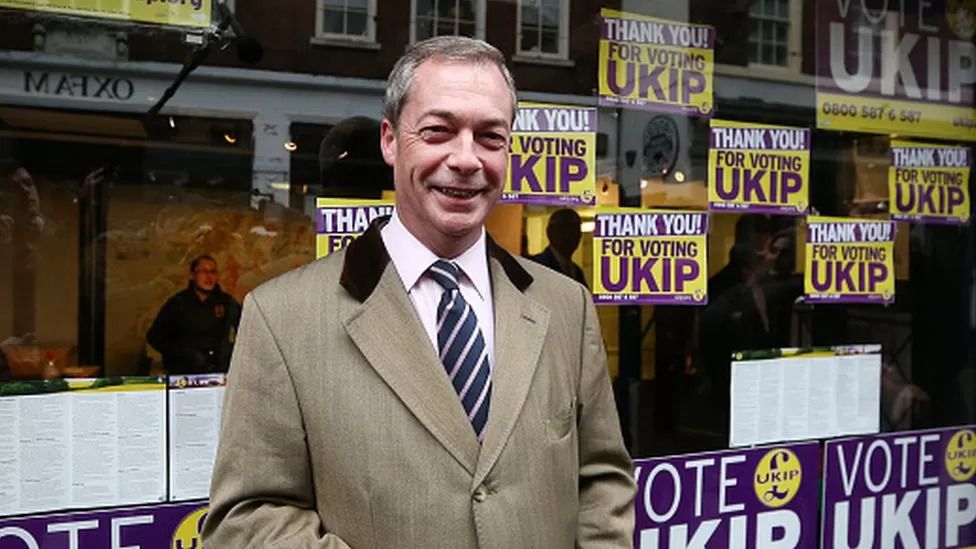
UKIP on brink of wipeout after losing all seats in local elections
In that year's elections to the European Parliament, the UK Independence Party (UKIP) triggered what its then-leader Nigel Farage called "an earthquake in British politics".
UKIP clinched 24 seats and 27% of the popular vote, marking the first time a party other than the Conservatives or Labour had won a UK national election for a century.
The result gave UKIP the momentum to push for a vote on the UK's membership of the European Union and campaign successfully for leaving.
Now, eight years on, the disruptor of British politics is staring down the barrel of electoral annihilation.
Following local elections across England last week, UKIP lost all its remaining district and county councillors.
To put that into context, the party has gone from almost 500 of those councillors in 2016 - its high watermark - to zero in 2023.
"It's no exaggeration to talk about a wipeout," said Tim Bale, a professor of politics and author of The Conservative Party after Brexit.
All that remains for UKIP are elected holdouts on parish and town councils, the lowest tier of local government.
The party's chairman, Ben Walker, said UKIP still has about 30 parish councillors, himself among them, after last week's local elections. "It certainly wasn't a disaster based on what we thought we'd get from these elections," he told the BBC.
Even so, the results overall show how far the party has fallen from the heights of 2014.
The BBC's results say, in total, UKIP lost 25 seats, which were last up for election in 2019.
Mr Walker said only one incumbent UKIP councillor - Steve Hollis in South Staffordshire - contested these elections for the party. He lost, while the party's only other sitting councillor retired.
Little by little, UKIP councillors have either defected to other parties or quit since 2019.
Post-Farage decline
The political fortunes of UKIP, originally a single-issue Eurosceptic party, have declined sharply since Mr Farage stood down as its leader in 2016.
Brexit was Mr Farage's crowing glory as leader, but since then, UKIP has been unsure of its place in the British political landscape and burned through six leaders, as it attempts to find a new purpose in a post-Brexit world.
Prof Bale said, although UKIP struck a chord with many voters who were hostile to the EU and didn't believe the Conservative government was doing enough to limit immigration, the party was "ultimately a vehicle for the political ambitions of one man - Nigel Farage".
"Once he abandoned them, they were always likely to fade away and die," Prof Bale said.
 Nigel Farage, a prominent Eurosceptic, resigned as UKIP leader in 2016
Nigel Farage, a prominent Eurosceptic, resigned as UKIP leader in 2016
Internal instability and infighting has not helped UKIP's cause, with Mr Farage himself criticising the party's drift towards a far-right, anti-Islam platform under former leader Gerard Batten.
"The problem we've had is a succession of failed leaders and misdirection," Mr Walker said.
"People look at us and think, well, you've kind of did what you meant to do, didn't you? We're out of Europe, your job's done. That's where we're at. So we're trying to redefine what we are now, which is no easy task."
Small parties squeezed
Under the current leadership of Neil Hamilton, a former Conservative MP, UKIP has been calling itself the "only truly patriotic political party" and promoting policies such as ending mass migration and scrapping most foreign aid.
That's similar territory to Reform UK, which was founded in 2018 as the Brexit Party, and which campaigned to leave the EU without a deal.
As Reform UK, the party has failed to make a big impression on the electorate recently, winning just six seats in last week's local elections.
The party, led by Richard Tice, had fielded hundreds of candidates, mainly in areas that had voted heavily to leave the EU in 2016.
Mr Walker said pooling resources with Reform UK and other like-minded smaller parties on the right was one route to an electoral revival for UKIP.
But Dr David Jeffery, a senior lecturer in British Politics at the University of Liverpool, said there appeared to be no way back for populist parties on the right of politics.
"Even Reform, the party to the right of the Conservatives with the most funding and media attention, without the galvanising issue of EU membership struggles to break past 6% in the polls," he said.
"The party is over for UKIP."
Many of those who voted for UKIP in the mid-2010s haven't gone away though. Instead, many of them switched to the Conservatives after former Prime Minister Boris Johnson promised to "get Brexit done".
"We are now one of the only Western democracies to not have a successful populist party," said Matthew Goodwin, a professor of politics and the author of a book about UKIP's rise.
"Much of this reflects how the Conservatives repositioned after Brexit to attract Nigel Farage's voters, though whether they can keep this force at bay, with rising immigration and a spiralling cost-of-living crisis, remains to be seen."










